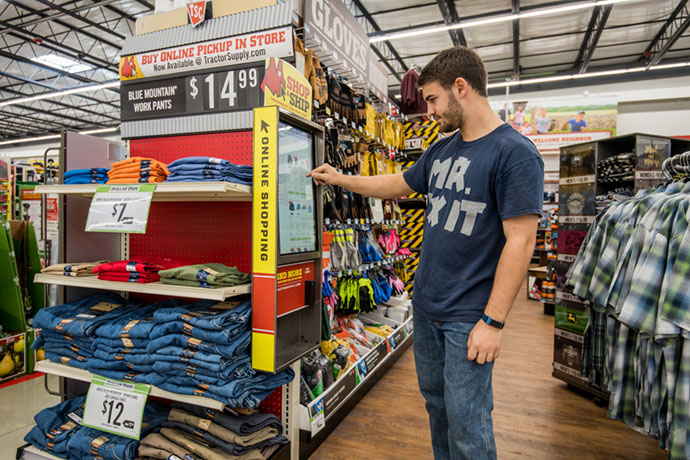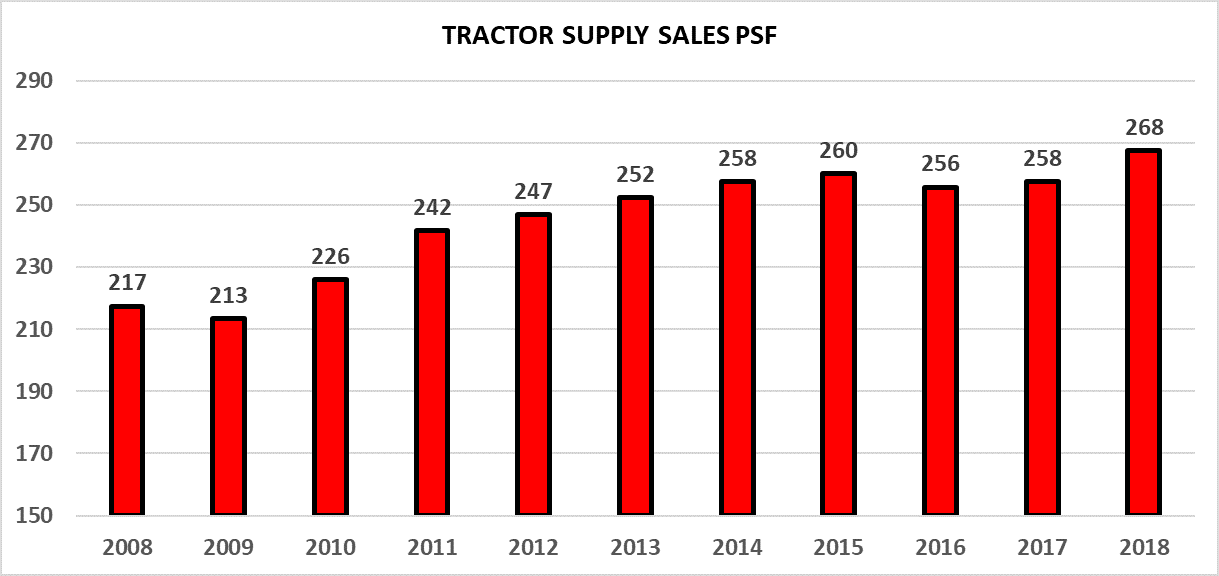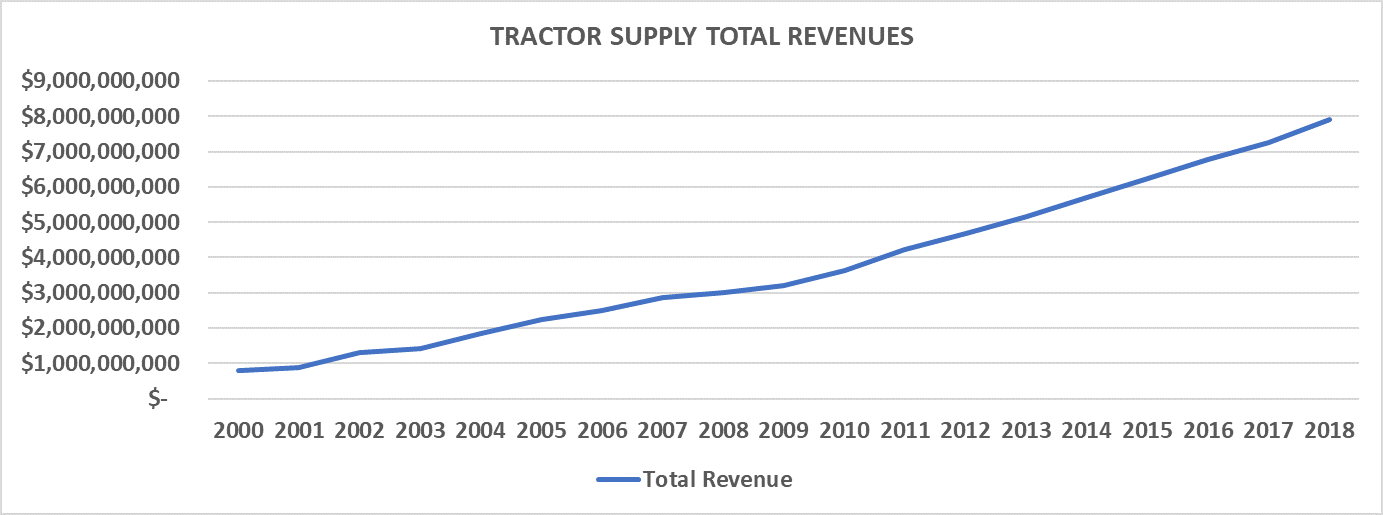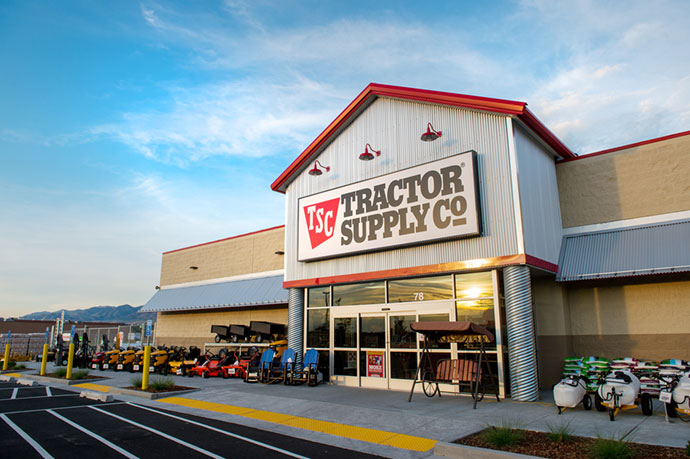A retail company based in Brentwood, Tennessee, is using a tried-and-true real estate strategy to grow its customer base in the American Heartland. From the factory to the farm, consistency has become the hallmark of progress and profitability for Tractor Supply Co. and its stores.
Founded in 1938, Tractor Supply Co. (TSC) now counts more than 1,900 stores in 49 U.S. states. Says CEO Greg Sandfort, “Our belief is that in our segment, with the customers we serve, we are going to be the holistic solution, period.”

With sales per square foot of $267.53 in 2018 and an average store sales revenue of $4.08 million last year, Tractor Supply is thriving because it is a company that understands what its customers want and need to buy.
Moreover, TSC is a company that sticks to a real estate plan and grows with a strong real estate strategy. “In a world where some companies try to over-innovate or keep up with the Joneses, TSC has been true to their brand and their customers and it’s paid off,” says Courtney Hall, chief marketing officer of Retail Strategies.
When you look at their track record of growing sales, store count and positive comp store sales, you get a retailer that is laser focused on the fundamentals. While other chains are cutting store counts, TSC is winning the race by consistently growing store volume and opening stores at a constant pace.

“If you don’t like surprises, then you will love TSC; they constantly produce growing earnings,” says Bill Read, executive vice president of Retail Specialists.
To understand TSC’s growth, first you must know their real estate requirements:
- A population minimum of 20,000 in the county.
- Farms – the more the better; cattle, horses and hay acreage are all important components.
- They want to be on the rural side of main retail areas of a community, with a strong preference to being on sites near Walmart Supercenters. Close proximity to home improvement retail is desirable, and grocery store proximity is a plus.
- Stores are generally 20 to 30 miles apart, but it varies upon density.
- The company aims to be a “trip consolidator,” saving shoppers the time and effort of having to run from Home Depot to Petco to Walmart to find just the right mix of what they’re looking for.
- For new construction, they want 3 to 4 acres so that they can build a 19,000-square-foot building plus a 15,000-square-foot outdoor display.
- For existing buildings, which are preferred, they seek 20,000 to 25,000 square feet plus 15,000 square feet for outdoor display. In some cases, such as in Alabama, they are taking over empty Babies R Us space.
Buy Online, Pick Up in Store
Tractor Supply reported in Q2 2019 that more than 70% of online orders were fulfilled in store. Considering the retailer is operating more than 1,900 stores, it is very encouraging that customers are utilizing the investment the retailer made in its brick-and-mortar properties and digital presence.

Unlike retailers flocking to the city, Tractor Supply is happy living the country life. They also report that mobile checkout will be available in 1,000 stores by the end of 2019. Omni-channel is not just a buzz word for urban markets and city life; it is also being adopted and proven successful in rural America. Discount department stores are the most popular retailer type using BOPIS, with 60% of them offering the option. The second highest categories are electronics stores and grocery stores: https://www.retailstrategies.com/focus-trends-buy-online-pickup-in-store/
More Key Observations
According to Jesse J. Limon, senior associate for National Retail Group:
- In speaking with friends that have built for Tractor Supply, going back 20 years ago, they based their new stores on cow counts in the county. These days they have a very strategic in-house plan they employ. We see mostly sites just off an interstate, typically stand-alone, single-tenant locations, and they really like a location where they can have as much outdoor space as indoor space.
- They focus on people. Even in dealings with their employees you will find a very loyal and cool-headed, people-oriented approach. Their mission statement says it all for me: “Work hard, have fun and make money by providing legendary services at great everyday low prices.”
- Toy R Us, Babies R Us, former grocery stores, old Walmart stores, former Kmart stores, and maybe older generation, well-located movie theater locations, and any failed big-box retailer are all possible TSC store locations. With a “secret mission” to open 1,000 more stores in the future, you might be seeing more Tractor Supply stores across the U.S. with new retailer closures.
- They tend to sign fair leases with typically NN leases, offer a hedge against inflation with rental increases every five years, and the locations are usually along a retail corridor, plus the tenant has a stellar track record as being good to deal with. Other positives: the tenant is strong, with a B2, investment-grade rating, they have huge store activity and the tenant reported 22 million store location searches (2017) from their website, which indicates a strong omni-channel presence and understanding of e-commerce needs.
- Negatives usually tend to be that the leases are NN and not NNN, some investors don’t like how tertiary the markets can be, and we see similar pushback with Dollar General stores in rural markets where they crush it.

Some Miscellaneous Notes
Brick-and-mortar retail is alive and well in the heartland.
The 80-year-old business has seen sales grow 56% in the past five years to $7.3 billion. Since 2012, Tractor Supply has added 723 locations, and it plans to open 500 more stores in the U.S. over the next decade. Apparently, the retail apocalypse hasn’t hit the hinterlands.
Tractor Supply’s profits have increased at an annual average of 9% since 2012, revenue at stores open more than a year has risen for eight consecutive years, and the company now collects $257 in annual sales per square foot of store.
“If you don’t like surprises, then you will love TSC; they constantly produce growing earnings.”
“Everything you need for life out here.” It’s a vague mantra but one that informs every decision at Tractor Supply. The farmers, ranchers and hobbyists the company caters to tend to have above-average income and below-average cost of living. They often don’t have the time or inclination to wait for products to come from the internet.

Having built up a loyal base of shoppers, Tractor Supply recently rolled out a handful of its own private-label products, taking a page from Costco Wholesale Corp.’s playbook: Huskee riding lawnmowers, 4Health Untamed dog food, and JobSmart tools, to name a few. One-third of its revenue dollars comes from these in-house brands, which represent a line of defense against online sellers.
Retail Strategies is a retail business consulting firm based in Birmingham, Alabama. For more information, go to www.retailstrategies.com.
